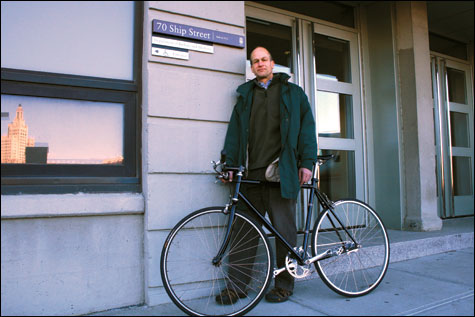
THE HUMAN SIDE OF TECHNOLOGY Bull. |
Christopher Bull is on the engineering faculty at Brown University, but what he teaches is a vision. “We all bear some responsibility in the direction the world goes,” he says, “and we need to accept that responsibility and act on it.”
For Bull, that means promoting sustainability and what he calls “appropriate technology” around the world — technology that directly responds to people’s needs, incorporates their input from the ground up, and protects the environment.
He’s got his hand in a slew of projects, and students in his classes, engineers and not, get drawn in. “I guess I’m more interested in action than study,” he says, “and I think that it’s important that students are engaged in solving real-world problems, not just abstractions.”
Right now, Bull is working on advanced batteries, next-generation electric cars, high-efficiency buildings, even a solar-powered plastics recycling system for Brazil. He also has students teamed up with local nonprofits, and he has just begun a particularly ambitious project in Providence.
It’s called Green the Knowledge District, and its goal is to turn the Knowledge District, nee the Jewelry District, into a model of energy efficiency and environmental, economic, and social sustainability.
The project is sponsored by the Ocean State Consortium of Advanced Resources (OSCAR), an outgrowth of Brown’s partnership with IBM to set up a supercomputer in the state. OSCAR now also includes other universities, hospitals, businesses, and state and city officials; Bull’s project is led by Brown, the University of Rhode Island, and the city’s Planning Department.
What they’re doing, Bull says, is seizing an opportunity: If Rhode Island were not in a slump, developers would be building all over the Jewelry District. But right now, “the economy is so bad that we have the luxury of thinking about sustainability.”
And they’re thinking big, mapping the flow of energy — electricity and natural gas — across the district, as well as the flows of traffic, people, resources, trash. They’re looking at how local businesses, institutions, and the small residential community interact with one another.
Senior Stefanie Lynch, who’s majoring in sustainable engineering and architectural design, is studying the “urban forest” in the district to make recommendations about green space.
As a college student, she says, “it’s easy to get caught up in idealistic visions for the future, which may not be realistic outside of a classroom.”
But with this project, she says, she’s seen “a real change in attitude,” people embracing environmentally sensitive design. “It’s incredibly motivating to know that what I’m working on will have an impact.”
Along with the big-picture analysis, Bull and his students are looking specifically at 70 Ship Street, a Brown biotech lab. They’re mapping energy use for the building and for each room, and correlating it to the weather, time of day, occupancy levels.
It’s only the first of several buildings they’ll examine, but Bull says it’s an important case study because biotechnology is a big part of the plans for the Knowledge District. It also offers a chance to look at sustainability on a smaller scale.
Asked what he expects to come out of these studies, Bull says it’s too early to say. But success in any endeavor, he suggests, can’t just be about technology. It has to be about people.